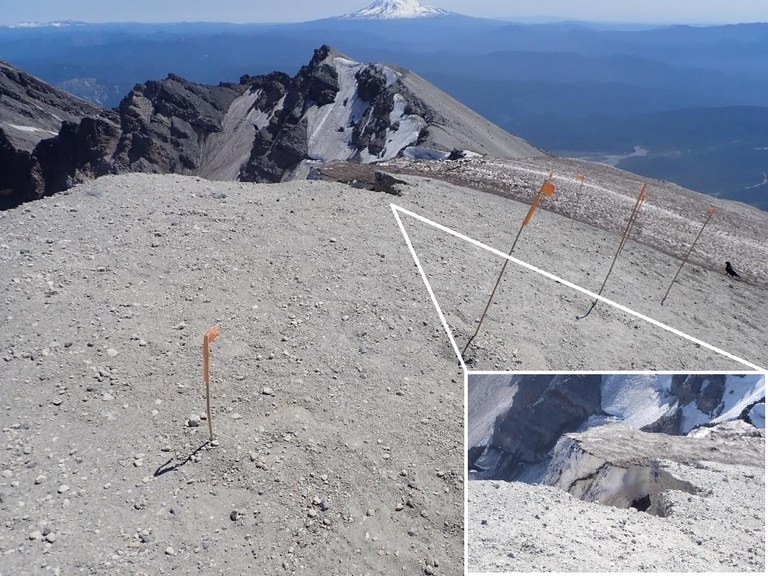Hiker Headlines: Mount St. Helens crater rim collapse, Lake 22 and Shoofly Fire trail closures
A large piece of the Mount St. Helens crater rim has collapsed, resulting in danger and instability at the top of the Monitor Ridge route. July 16 is the Bureau of Land Management’s birthday, and parking fees will be waived on its lands. Over a thousand hikers pledged to stay on trail on Washington Trails Day this year! And be aware of several trail closures and fire restrictions as you plan your next adventure.
It’s July 11. A large piece of the Mount St. Helens crater rim has collapsed, resulting in danger and instability at the top of the Monitor Ridge route. July 16 is the Bureau of Land Management’s birthday, and parking fees will be waived on its lands. Over a thousand hikers pledged to stay on trail on Washington Trails Day this year! And be aware of several trail closures and fire restrictions as you plan your next adventure. Here’s some news you may have missed while out on trail this week.

The flagged-off danger zone at the Mount St. Helens crater rim (at the top of the Monitor Ridge route) after a partial collapse, along with a close-up of the collapsed area. Photos by Andy Goodwin, courtesy of the Forest Service.
Mount St. Helens partial crater rim collapse: On July 6, a chunk of the Mount St. Helens crater rim collapsed, which rendered the top of Monitor Ridge incredibly unstable. It will remain hazardous for some time. The gap in the cornice makes this very dangerous section seem like a good place to look into the crater, but it is not safe to do so. Please avoid stepping into the danger zone, which has been sectioned off by flags.
Fee-free day: Next Tuesday, July 16, is the Bureau of Land Management’s (BLM) birthday, and to celebrate, parking fees will be waived on all lands managed by BLM.
1,000+ hikers pledge to stay on trail: June 22 was Washington Trails Day. WTA visited trailheads at Samish Overlook, Snow Lake, High Rock, Esmeralda Basin and Riverside State Park to talk with hikers about the importance of staying on trail. Across the state and online, over 1,000 hikers (and counting) have pledged to stay on trail. Join them and take the pledge yourself, because how we hike matters — to other hikers, to trails and to the ecosystems that surround them.
Trail and road closures: Heads up! Several trails are or will be affected by closures these next few weeks:
- The Lake 22 trail will be closed through Oct. 10 for maintenance and repair work.
- Multiple trails in the Wenatchee River Ranger District are closed due to the Shoofly Fire. They include Cady Creek, Cady Ridge, Top Lake, Poe Mountain, Lake Minotaur, Little Wenatchee, Heather Lake, Little Wenatchee Ridge and Irving Pass.
- The road to the Mallardy Ridge trailhead and the trailhead itself are closed through Oct. 15, restricting access to the Walt Bailey Trail.
- The West Fork Buttermilk Road will be closed from July 15 through Aug. 10 for construction, restricting access to the West Fork Buttermilk Trail.
- The Potter’s Trail in the Green River Natural Area near Enumclaw will be closed from July 15 through Aug. 8 for a bridge replacement project.
Campfire restrictions: We’re in wildfire season now (see above for many trails closed already from the Shoofly Fire!), and many land managers have implemented fire restrictions and bans:
- The Washington Department of Natural Resources (DNR) has implemented a complete burn ban across the state. All outdoor burning, campfires, charcoal briquettes and prescribed burns are banned on all DNR lands through Sept. 30, unless otherwise stated.
- North Cascades National Park has banned all campfires in the national park, Ross Lake National Recreation Area and Lake Chelan National Recreation Area, including all lands and campgrounds along Highway 20, Hozomeen and Stekehin Valley. Cooking stoves that use liquid petroleum that can be turned off remain permitted.
- Okanogan-Wenatchee National Forest is now only permitting fires in designated developed recreation sites and specific wilderness areas (a stage 1 fire restriction). Keep in mind that some places in the national forest have fire bans year-round.
- Starting July 12, Gifford Pinchot National Forest will only allow fires in metal rings at developed recreation sites and the use of portable cooking stoves, propane campfires or lanterns using liquefied/bottled fuel that can be turned off.
- Starting July 13, Olympic National Forest and National Park are implementing a burn ban for all backcountry and dispersed area campfires will not be allowed, including the use of charcoal grills or other equipment that creates ash. Gas or propane camp stoves with a shut-off valve or lever that extinguishes the flame immediately are permitted in these areas but should be operated far from flammable vegetation and forest litter.
- Washington State Parks has implemented fire restrictions or complete fire bans in many state parks. Check the specific state park’s current burn ban status before planning your trip there.
- Umatilla National Forest designated its fire danger levels as high — please recreate with caution when in the national forest.
BE IN THE KNOW
- Keep up to date with Trail News, our monthly email newsletter.
- Search our Hiking Guide to find your next adventure.
- Check trip reports for latest conditions on trails. And if you go for a hike, file your own trip report.
- Sign up for Families Go Hiking, our email newsletter for families with plenty of tips on keeping kids busy.
- Sign up for Trail Action Network to stay up to date on issues impacting trails and ways to get involved.


Comments